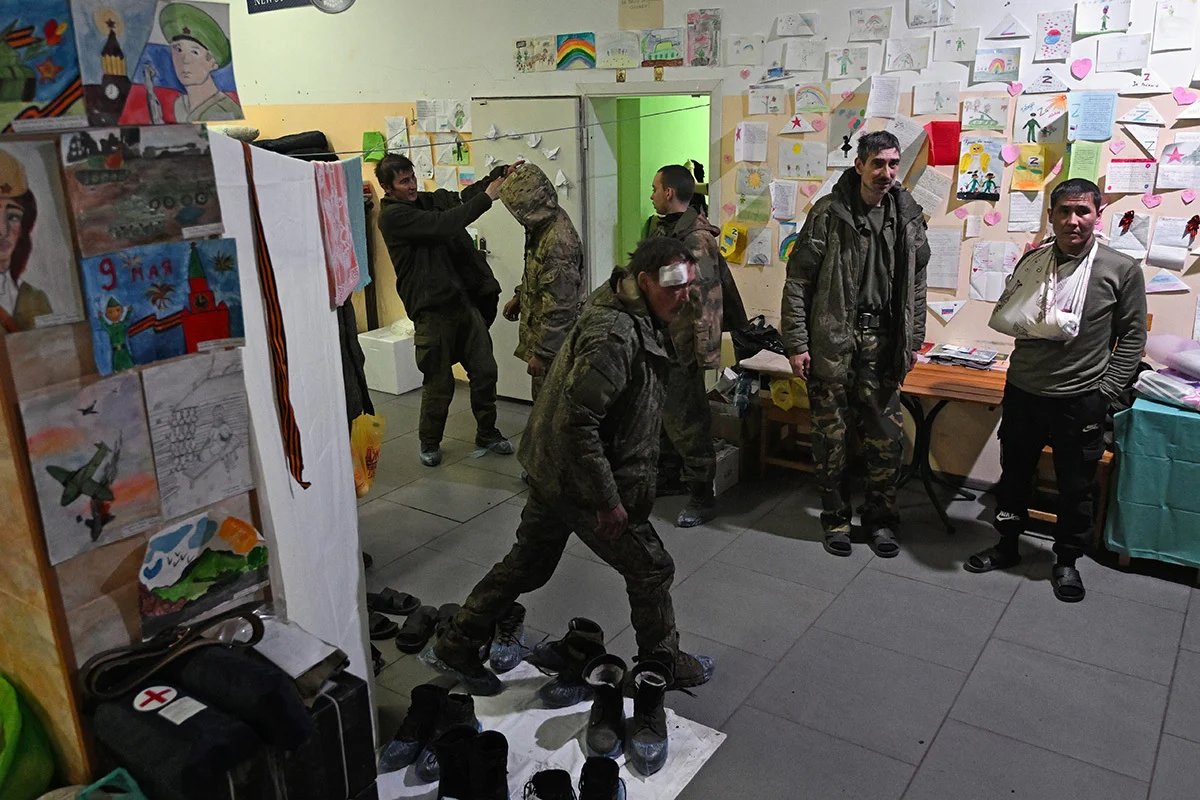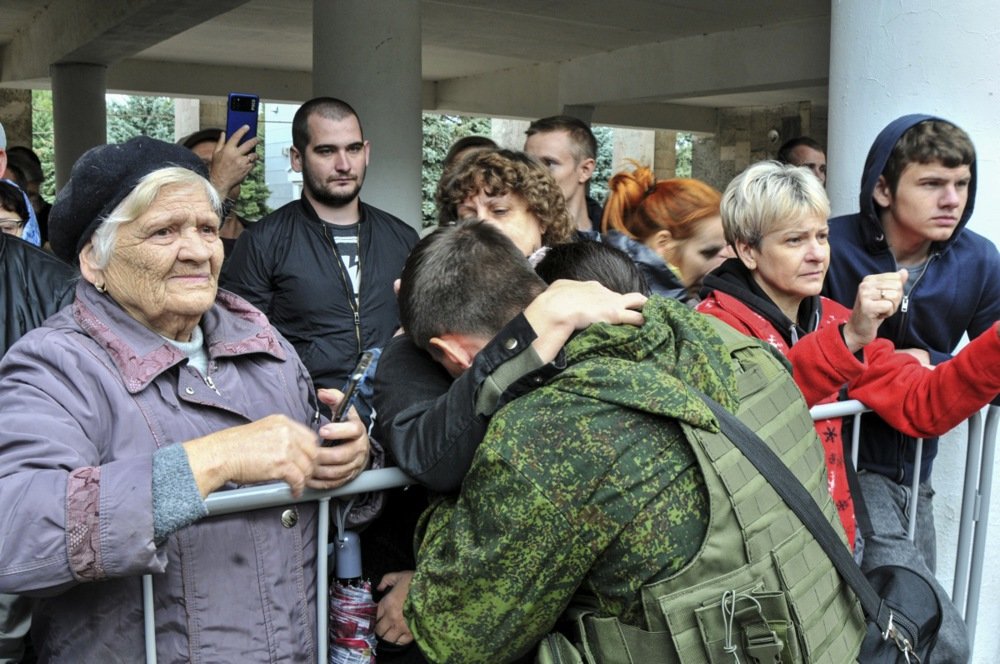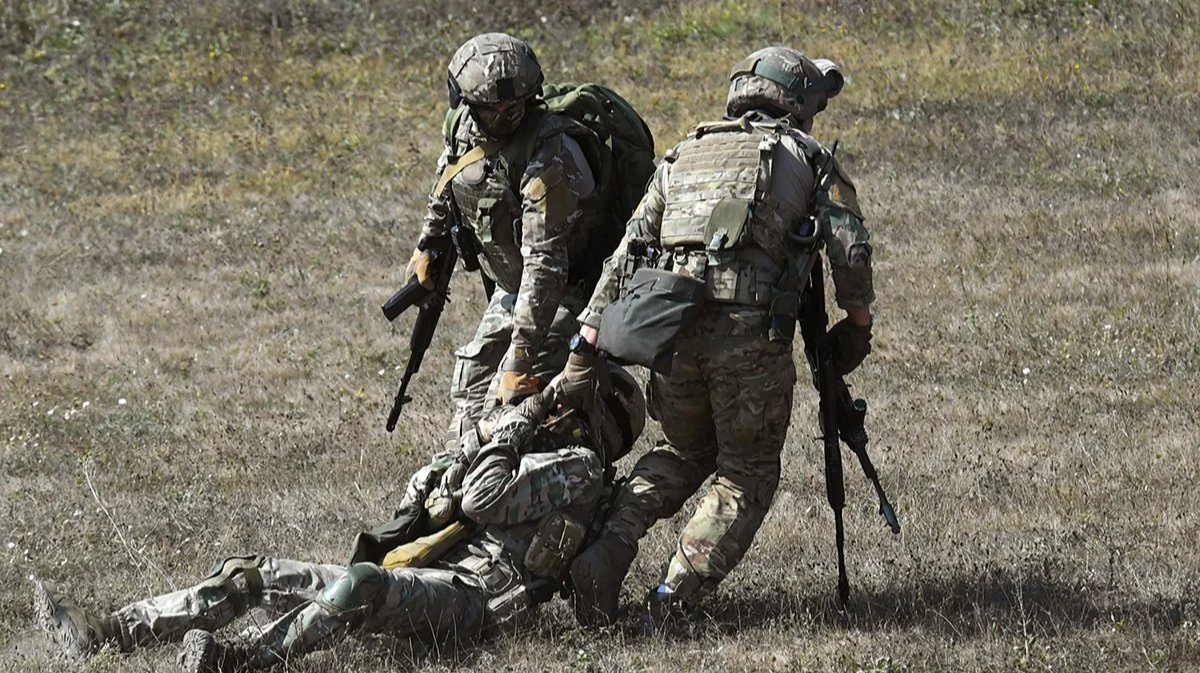Anti-war project Get Lost, which was created to assist Russian men evade or escape conscription in Ukraine, has declared 29 February “Deserter’s Day”.
“We have been taught to treat deserters as weaklings and traitors, as second-class people,” the group said. “Today we live in a world where the Russian army brings only death and destruction. Deserting is the easiest way to help your country.”
According to Get Lost, instances of desertion from the Russian army increased tenfold this year. In January last year, just 28 men deserted from the Russian army; the number for January this year was 284. Privately contracted soldiers account for 50% of desertions, while mobilised reservists make up 30%, Get Lost, which has been in contact with 2,000 men who fled the front line, has found.
Desertion and refusal to participate in the war is increasingly a problem for the Russian military, despite the introduction of a harsher 10-year prison sentence for those who abscond. Vladimir Putin’s declaration of partial mobilisation in September 2022 also established new rules punishing those who fail to report to military enlistment offices, surrender, destroy weapons or engage in looting. It also prohibited military personnel from resigning their commission, making it legally impossible to leave the army alive and in good health. It’s perhaps unsurprising therefore that Russian courts saw a 400% year-on-year increase in the number of desertion cases last year, according to Mediazona.
Novaya Europe spoke to some of those who came to believe desertion was their only way to survive.
‘Some shoot themselves in the foot to get out’
Thanks to Farewell to Arms, a volunteer-run organisation that helps Russian men evade military service, Ivan now lives in Kazakhstan. Many deserters head to Kazakhstan as Russians do not require an overseas passport to enter the country. Conscious that it’s a risk for deserters to remain there for a long time, volunteers are working to secure him safe-passage to a third country.
Ivan was an officer when the war began. While at first his refusal to fight was enough to legally avoid the front line, partial mobilisation changed everything. With the prospect of deployment fast becoming a reality, he knew he had no other choice but to leave.
“Even before the war started I had tried to quit. I didn’t like the military system and no longer wanted it to be a part of my life. None of my subordinates escaped from the front line, but I sent them on leave as often as I could and the majority simply didn’t return.”
“Sometimes I talk to soldiers I served with who are still in Ukraine. Their moods vary. Some, who have been on the front line for almost two years, say they feel fine now and wouldn’t go even if the opportunity arose.”
“People get tired in those unbearable conditions and they want to leave. First they look for legal routes, and when they see there are none, they run.”
“Word of mouth is powerful: I don’t think there is a single Russian soldier on the front who hasn’t heard of Get Lost.”
“Desertion is as hard as it ever was and it all depends on where the soldier is. To leave the front he must either be granted furlough or be sent to a hospital, from where he’ll leave for another country, legally or illegally.”
“Running from the front line is very dangerous. People are fully aware that there are criminal consequences but that doesn’t stop them. Some pretend they are one of the dead or injured; some shoot themselves in the foot to get out to a hospital and then escape from there.”

Wounded soldiers at a Russian field hospital in Donetsk, Ukraine 6 March 2023. Source: Anatoly Zhdanov / Kommersant / Sipa USA / Vida Press
‘It was a desk job’
Vadim is a computer programmer who signed a contract with Russia’s Defence Ministry in 2018. Senior military command refused to accept his resignation and when he was told to prepare for deployment to the front line, he left Russia. He and his boyfriend now live in relative safety but you can tell from his voice that he’s worried.
“I graduated from the Moscow Institute of Physics and Technology with a specialisation in programming. A spokesperson for the Ministry of Defence came to the university to recruit us for one year of military service in the army’s scientific research division. As I met the requirements, I agreed to serve for a year in Moscow. They taught us to shoot and march in formation, but aside from that I was mainly working with computers.”
“At the end of my service they offered me a five-year contract, which gave me an officer’s rank and a decent salary. I agreed, as it was a desk job. At first I enjoyed it, but then it became clear that the army doesn’t care for its people. I started to dislike the way the country was headed politically, and my salary became too little to live on. In December 2021 I submitted my resignation and registered as self-employed, a breach of my contract, but heard nothing. In February I stopped going to work. In response a senior command told me to withdraw my resignation or face legal action and at the time I decided it best to return.”
“After the invasion began I declined to be deployed to the front line. My unit was far enough geographically from the fighting for me to feel safe. Since I couldn’t quit, I thought I would wait out the remaining year and a half of my contract.”
“When mobilisation was declared I was instructed to report to my unit with my belongings ready for deployment. News was circulating that Putin’s decree meant our contracts had been extended indefinitely and that it had become a criminal offence to refuse to fight. I packed my bags and was in Kazakhstan three days later.”
“Three months later they opened a case against me for desertion and put me on the wanted list. I no longer speak to any of my former colleagues. They don’t approve of what I did. But at first they called me, told me I had abandoned them and bombarded me with threats.”
“People in Kazakhstan are understanding towards deserters. For now we are safe, but the government here could start extraditing us at any time. My boyfriend and I are very worried that we’ll have nowhere to go.”

A Russian conscript says goodbye to family outside a recruiting office in Bataysk, Rostov region, 26 September 2022. Photo: EPA-EFE/ARKADY BUDNITSKY
‘If you want to survive, you’ll survive’
Army conscription never crossed Kirill’s mind. Born in Yakutia, in the Russian Far East, he completed his mandatory one-year military service in 2012 and returned home to work in the construction industry. He hadn’t paid much attention to the war in Ukraine until one day in September 2022 when his employer informed him that he’d been mobilised.
“In the moment I didn’t understand. What mobilisation? What war? Why me?”
“They told me to report to the enlistment office or they’d open a case against me. So I went. The next morning I was on a plane. When I arrived at my unit I knew I had to leave and told the commander, but he just laughed. He said: “You will go to war, and if you refuse you will go to prison, and from there you’ll be sent back here.” When he said that I decided to run.”
Kirill was lucky. His unit was deployed to the Siberian province of Buryatia, the same place he had completed his service ten years earlier. He knew that there was a hole in the fence surrounding the compound, and miraculously it was still there. He escaped and flew to Novosibirsk, and from there Kazakhstan. Three days after his escape his name was put on a wanted list and a case opened against him for desertion. He spoke about others hoping to escape the front line.
“Is it harder now? I don’t know. Now there are groups like Get Lost who are helping soldiers. Now at least people know that they should never go to the enlistment office, that they can legally challenge the summons, and if that you find yourself on the front line, to try to escape via a hospital. Before we had no idea what to do.”
“At the same time it’s dangerous to leave Russia after receiving a summons, as the military authorities know people go abroad to avoid having to serve. But if you want to survive, you will. Whether that means running away, surrendering, or simply avoiding the enlistment office.”
Join us in rebuilding Novaya Gazeta Europe
The Russian government has banned independent media. We were forced to leave our country in order to keep doing our job, telling our readers about what is going on Russia, Ukraine and Europe.
We will continue fighting against warfare and dictatorship. We believe that freedom of speech is the most efficient antidote against tyranny. Support us financially to help us fight for peace and freedom.
By clicking the Support button, you agree to the processing of your personal data.
To cancel a regular donation, please write to [email protected]

